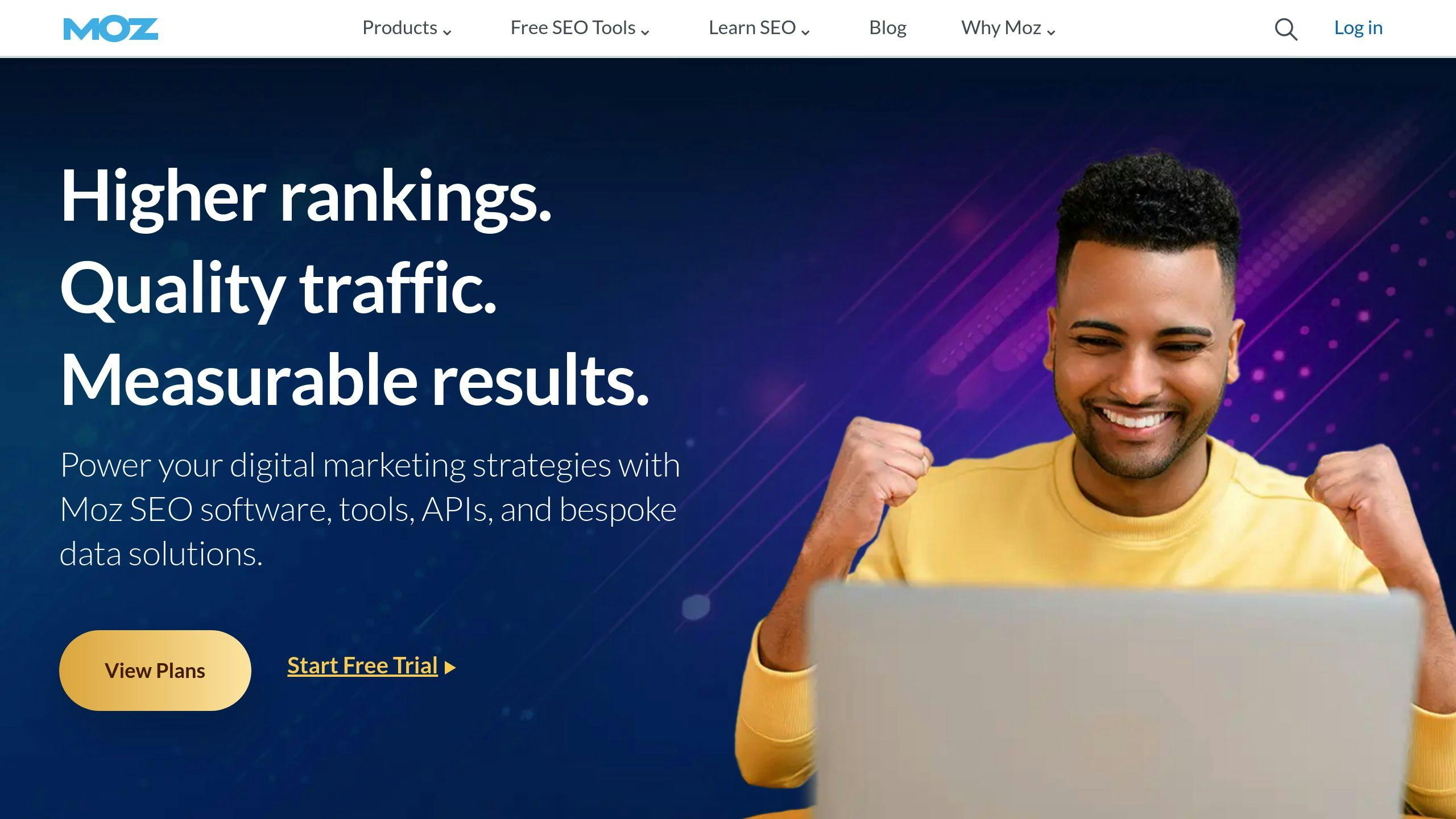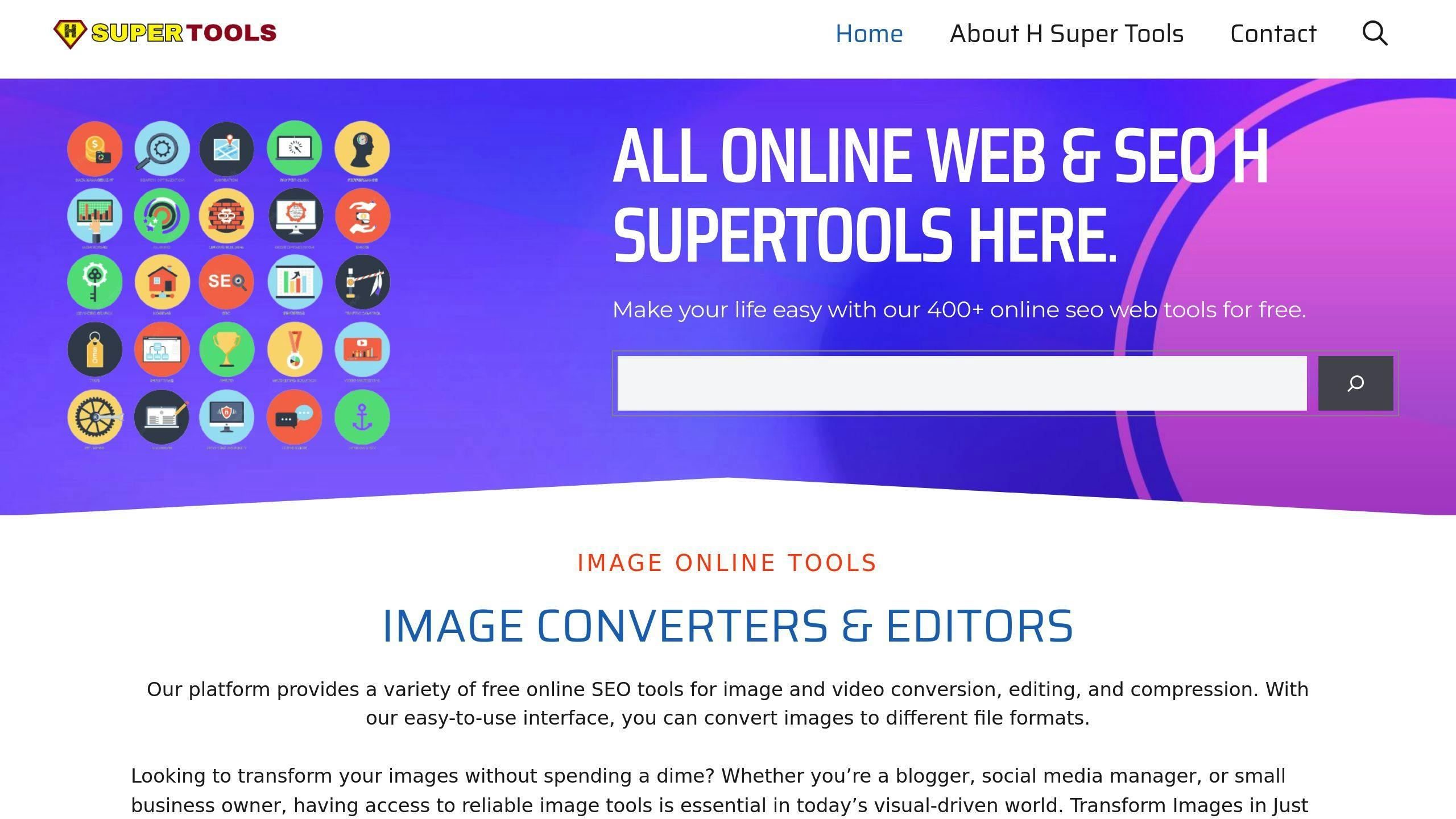Looking for tools to boost your SEO in 2025? Here's a quick rundown of the top 7 search volume tools to help you find the best keywords, analyze trends, and improve your rankings:
- Google Keyword Planner: Free, beginner-friendly tool for basic keyword insights directly from Google.
- SEMrush: Advanced keyword research and competitor analysis, starting at $119.95/month.
- Ahrefs: Comprehensive data for keyword and backlink analysis, starting at $99/month.
- Moz Keyword Explorer: Simplified keyword prioritization with detailed metrics, starting at $99/month.
- Ubersuggest: Affordable and easy-to-use, ideal for small businesses, starting at $29/month.
- H-Supertools: Free and beginner-friendly for basic keyword research.
- Keyword Tool: Multi-platform keyword suggestions for niche markets, starting at $89/month.
Quick Comparison
| Tool | Best For | Key Features | Pricing |
|---|---|---|---|
| Google Keyword Planner | Beginners, PPC campaigns | Free search data, seasonal trends | Free |
| SEMrush | Agencies, SEO professionals | Keyword difficulty, SERP analysis | $119.95+ |
| Ahrefs | SEO experts, content strategists | Multi-platform data, backlink insights | $99+ |
| Moz Keyword Explorer | Simplified keyword scoring | SERP analysis, organic CTR estimates | $99+ |
| Ubersuggest | Small businesses, beginners | Content ideas, long-tail keywords | $29+ |
| H-Supertools | Startups, individual marketers | Free keyword research, trend analysis | Free |
| Keyword Tool | Niche marketers | Multi-platform autocomplete suggestions | $89+ |
These tools cater to different needs and budgets, from free options like Google Keyword Planner to advanced platforms like SEMrush and Ahrefs. Choose one based on your goals, whether you're a beginner or an experienced SEO professional.
BEST Keyword Search Volume Tools for SEO in 2025
What to Look for in a Search Volume Tool
Choosing the right search volume tool for your SEO efforts in 2025 means focusing on features that meet your specific needs and deliver reliable results.
Accuracy and Data Sources
Accurate data is the backbone of effective keyword research. Look for tools that pull data directly from search engines or aggregate information from multiple platforms. This ensures you get a complete picture of keyword performance.
Ease of Use
A good tool should balance advanced features with a user-friendly interface. It should let you analyze data quickly without requiring a steep learning curve.
Integration Capabilities
Your tool should work smoothly with other SEO and analytics platforms. Options like SEMrush and Ahrefs provide API access and export features, making it easy to share data across your marketing stack [3][4].
| Feature Category | Key Elements | Why It’s Important |
|---|---|---|
| Data Quality | Historical trends, real-time updates | Helps make better decisions |
| Analysis Tools | Keyword difficulty, SERP analysis | Assesses ranking potential |
| Reporting | Custom reports, data export | Makes sharing insights easier |
| Updates | Regular data refreshes | Ensures accuracy over time |
Advanced Features and Metrics
Modern tools go beyond basic keyword data. They include advanced metrics like:
- Keyword difficulty scores
- Search intent analysis
- Geographic and demographic breakdowns
- Seasonal trends
- Tracking search volumes on platforms like Google and YouTube
- AI-powered predictions for future trends
Pricing Considerations
Premium tools like SEMrush (priced at $139.95/month) [2][6] often justify their costs with extensive features. Take advantage of free trials to evaluate if a tool meets your needs before committing to a subscription.
The Top SEO Marketing Directory is a good resource for comparing tools and finding options that suit your goals. By focusing on these features, you can select a tool that enhances your keyword research and aligns with your SEO strategy.
Next, we’ll dive into the best search volume tools for 2025 and see how they stack up.
1. Google Keyword Planner

Google Keyword Planner is a go-to tool for accessing Google's search data. Part of the free Google Ads suite, it offers keyword insights that are useful for both SEO experts and advertisers.
Key Features
- Average monthly searches: Gives an idea of how often a keyword is searched.
- Competition levels: Shows how competitive a keyword is for advertisers.
- CPC estimates: Provides cost-per-click data for paid campaigns.
- Seasonal trends: Highlights search patterns over time.
Data and Accuracy
This tool pulls data straight from Google's database, offering search volume estimates in ranges rather than exact numbers [5]. Its integration with Google Ads and Google Trends makes it easier to align SEO efforts with paid advertising strategies [1][3].
| Feature | Description | Benefit |
|---|---|---|
| Search Volume Data | Broad range estimates | Helps identify popular terms |
| Trend Analysis | Tracks seasonal patterns | Aids in timing your strategy |
| Keyword Suggestions | Offers related terms | Expands your keyword options |
| Competition Metrics | Rates competition levels | Guides keyword selection |
Pricing and Accessibility
It’s completely free to use, though you’ll need a Google Ads account to access it. This also opens the door to other tools within the Google Ads suite.
Ideal Use Cases
- Starting keyword research
- Planning PPC campaigns
- Analyzing seasonal trends
- Conducting basic competitor research
- Finding long-tail keywords
Drawbacks
Since it’s primarily designed for advertisers, it doesn’t include some advanced SEO-focused features that paid tools provide [5].
Google Keyword Planner is a solid starting point for keyword research, especially for those on a budget. While it covers the basics well, more advanced tools might be better suited for in-depth SEO tasks.
2. SEMrush

SEMrush is a well-known tool in the SEO world, offering reliable search volume data by leveraging its extensive integration with Google's search data.
Key Features and Insights
SEMrush's tools are designed to help users dive deep into market analysis. The Keyword Magic Tool, in particular, delivers useful information like:
- Search volume and keyword difficulty metrics
- Competition levels for keywords
- Cost-per-click (CPC) estimates
- Seasonal trends to spot keyword popularity shifts
Seamless Integrations
SEMrush works smoothly with several platforms, including:
- Google Analytics for traffic insights
- Google Ads for ad campaign analysis
- Various content management systems
- Tools for conducting SEO audits
Data and Metrics Overview
| Feature | Description | Advantage |
|---|---|---|
| Keyword Database | Covers 130+ countries globally | Helps with in-depth market research |
| SERP Analysis | Provides live ranking data | Offers valuable competitor insights |
Pricing and Use Cases
SEMrush has flexible pricing options, starting at $119.95/month for basic research needs and going up to $449.95/month for enterprise-level features like API access. It’s a great fit for tasks such as:
- Finding new keyword opportunities
- Analyzing competitor keyword strategies
- Monitoring rankings and performance over time
- Enhancing content to improve visibility
Drawbacks to Consider
The Pro plan comes with limits on daily reports and keyword tracking. For advanced needs like API access or white-label reporting, upgrading to higher-tier plans is necessary.
While SEMrush is packed with features aimed at experienced users, tools like Ahrefs also bring unique strengths to the table for keyword and competitor research.
3. Ahrefs

Ahrefs is a powerful tool for analyzing search volume, pulling data from various search platforms. Its Keywords Explorer feature delivers detailed keyword metrics and provides reliable search volume estimates.
Broad Data Coverage
With a database of over 1 billion keywords spanning 10 search engines like Google, YouTube, Amazon, and Bing, Ahrefs offers insights across multiple platforms. It also provides competitor analysis, click-through rate data, and first-page competition metrics, making it a go-to resource for understanding keyword performance.
Key Features and Tools
| Feature | Function | Advantage |
|---|---|---|
| Keywords Explorer & Click Metrics | Tracks search volume, keyword difficulty, and SERP click data | Helps pinpoint ranking opportunities and traffic potential |
| Content Explorer | Analyzes content gaps | Highlights untapped keywords for content optimization |
| Competitor Analysis | Provides backlink and ranking insights | Supports strategic keyword targeting |
Pricing Options
Ahrefs' plans range from $99/month for basic features to $999/month for advanced enterprise-level tools.
Integration and Content Tools
The Content Explorer tool is particularly useful for identifying content gaps and discovering new keyword opportunities. It’s an essential feature for refining your keyword strategy and uncovering areas where competitors may have overlooked opportunities.
Reliable Data and Regular Updates
Ahrefs combines data from multiple sources to deliver accurate search volume estimates. This allows users to find low-competition keywords with high traffic potential, analyze competitor strategies, and optimize their content for better visibility in search results.
Whether you're just starting out or have years of experience, Ahrefs offers precise data and advanced tools to meet your needs. While it shines in competitor analysis and multi-platform coverage, the next tool, Moz Keyword Explorer, is designed with intuitive keyword research in mind for users of all levels.
4. Moz Keyword Explorer

Moz Keyword Explorer is a search volume estimation tool designed to balance precision with ease of use. Its detailed metrics and analysis features empower SEO professionals to make informed choices.
Key Metrics and Insights
Moz Keyword Explorer provides critical keyword data through:
| Metric Type | Description | Purpose |
|---|---|---|
| Search Volume | Monthly search estimates | Identifies keywords with strong traffic potential |
| Keyword Difficulty | Score from 1 to 100 showing ranking difficulty | Helps focus on achievable keywords |
| Organic CTR | Predicted click-through rates | Estimates potential traffic |
| Priority Score | Combines multiple factors into one value | Simplifies keyword prioritization |
Integration and Competitor Insights
This tool works seamlessly with other Moz products, creating a smooth and unified SEO workflow. Its SERP analysis feature offers a closer look at competitor rankings and reveals content gaps - making it easier to spot and target valuable keyword opportunities.
Pricing and Database
Moz offers both free and paid plans, making it accessible for businesses of various sizes. Its database is updated regularly, prioritizing accuracy to ensure reliable keyword insights. While its database may not be as large as Ahrefs', Moz Keyword Explorer focuses on delivering precise data without unnecessary complexity.
If you’re looking for a tool that combines accuracy with simplicity, this is a solid choice. Up next, we’ll explore Ubersuggest, a budget-friendly option packed with features tailored for smaller businesses.
sbb-itb-5be333f
5. Ubersuggest

Created by Neil Patel, Ubersuggest simplifies keyword research, making SEO data easier to understand for small businesses and individual marketers.
Key Features and Integration
Ubersuggest pulls data from Google's autocomplete, combined with basic analytics, to provide actionable insights. It works seamlessly with platforms like Google, YouTube, and Amazon, offering a solid range of keyword options:
| Feature | Description | What It Does |
|---|---|---|
| Search Trends | View historical data easily | Spot keyword opportunities fast |
| Basic Analysis | Overview of domains | Helps beginners analyze rivals |
| Difficulty Score | Measures competition | Guides keyword targeting |
| Content Ideas | AI-driven topic suggestions | Helps plan content effectively |
Pricing Made Simple
Ubersuggest keeps its pricing straightforward:
| Plan Type | Ideal For |
|---|---|
| Free Version | Bloggers and beginners testing keyword tools |
| Paid Plans | Small businesses needing unlimited searches |
Focused Data for Content Marketing
Although its database is smaller than enterprise-grade tools, Ubersuggest shines by delivering focused, easy-to-use data. It’s particularly useful for:
- Discovering keywords quickly
- Conducting basic competitor research
- Generating content ideas
- Finding long-tail keywords
The tool is designed to simplify search volume data, avoiding overwhelming metrics. This makes it perfect for users who need practical insights without a steep learning curve.
While Ubersuggest stands out for its simplicity and affordability, H-Supertools might be a better choice for those with more specific keyword research needs.
6. H-Supertools

H-Supertools is a free platform designed for keyword research, offering search volume estimation in a straightforward and easy-to-use interface. It’s built to cater to users at all experience levels, making it a practical choice for many.
Core Features
| Feature Category | Capabilities | How It Helps |
|---|---|---|
| Keyword Analysis | Tracks search volume and trends | Helps find content opportunities |
| Keyword Research | Provides competitor insights | Supports smarter targeting strategies |
| Long-tail Keywords | Discovers niche keywords | Highlights low-competition options |
Data and Integration
H-Supertools pulls reliable search volume data from various trusted sources. It integrates seamlessly with:
- Google Ads for campaign optimization
- Popular SEO tools
- Content management systems
Who Can Benefit?
This tool’s focus on keyword research and trend analysis makes it useful for different types of users:
| User Type | What They Gain |
|---|---|
| Beginners & Small Businesses | Easy-to-use interface, cost-efficient research |
| Content Creators | Ideas for topics, trend insights |
| Freelancers | Quick validation of keywords |
Support and Accessibility
H-Supertools prioritizes user privacy and provides helpful support resources. Its no-cost model, combined with essential functionality, makes it a solid option for those just starting out or working with tight budgets.
While H-Supertools is a great fit for beginners and those looking for a budget-friendly solution, the next tool, Keyword Tool, takes a different approach to search volume estimation.
7. Keyword Tool
Keyword Tool taps into Google's autocomplete data to provide keyword suggestions for platforms like Google, YouTube, Amazon, and Instagram.
Core Features
Keyword Tool generates thousands of keyword ideas from a single seed keyword, making it a go-to choice for exploring keyword opportunities.
| Feature | Purpose | Use Case |
|---|---|---|
| Multi-Platform Support | Broader keyword discovery | Research for Google, YouTube, Amazon, Instagram |
| Long-Tail Keywords | Focused niche targeting | Tailored search terms for specific platforms |
| Autocomplete Data | Insights into real user queries | Understand organic search behavior |
Data Insights
By analyzing autocomplete data, Keyword Tool highlights user-driven trends and niche search behaviors, making it ideal for discovering untapped opportunities across various platforms.
Pricing Options
| Plan | Features | Suitable For |
|---|---|---|
| Free Version | Basic keyword suggestions, Limited data | Small-scale projects, Initial exploration |
| Pro Version | Advanced tools, More suggestions, Multi-platform support | Larger campaigns, SEO professionals |
Integration Options
Keyword Tool works seamlessly on its own or alongside platforms like Google Keyword Planner and SEMrush, offering flexibility for comprehensive keyword strategies.
Drawbacks
The free version has limited functionality, which may not meet the needs of large-scale campaigns. Upgrading to the Pro version is often necessary for in-depth research.
Keyword Tool stands out for its ability to identify platform-specific search patterns, making it particularly useful for businesses aiming to improve visibility in niche markets. Next, we’ll compare these tools side by side to help you decide which one fits your goals best.
Comparison Table of Search Volume Tools
Here's a side-by-side look at popular search volume tools, breaking down their features, strengths, and pricing to help you choose the right one for your SEO goals.
Core Features and Pricing Comparison
| Tool | Key Features | Best For | Monthly Pricing |
|---|---|---|---|
| Google Keyword Planner | Search volume data, Google integration | Beginners, Ads campaigns | Free |
| SEMrush | Advanced keyword research, competitor analysis | Digital agencies, SEO pros | $119.95+ |
| Ahrefs | Detailed metrics, backlink analysis | SEO professionals, Content strategists | $99+ |
| Moz | Priority scoring, SERP analysis | Marketing agencies, Data analysts | $99+ |
| Ubersuggest | Basic research, content ideas | Small businesses, Beginners | $29+ |
| H-Supertools | Simple keyword research interface | Startups, Individual marketers | $15+ |
| Keyword Tool | Multi-platform keyword suggestions | Niche marketers, Platform research | $89+ |
Specialty Areas
| Tool | Primary Strength |
|---|---|
| SEMrush | Competitive analysis with global keyword coverage (25B+ keywords) |
| Ahrefs | Advanced backlink analysis across multiple platforms |
| Moz | Simplified scoring system focused on Google data |
| Ubersuggest | User-friendly content suggestions with regional keyword insights |
Integration Capabilities
| Tool | Native Integrations | Export Features |
|---|---|---|
| Google Keyword Planner | Google Ads, Analytics | Yes |
| SEMrush | Google Search Console, Analytics, Data Studio | Yes |
| Ahrefs | WordPress, Chrome Extension | Yes |
| Moz | Google Analytics, Chrome Extension | Yes |
Your choice of tool will depend on factors like your budget, technical skills, and business needs. For larger teams, SEMrush or Ahrefs might be ideal, offering more advanced features. Smaller businesses or individual marketers may find tools like Ubersuggest or H-Supertools a better fit.
For more personalized recommendations, check out the Top SEO Marketing Directory, which matches businesses with tools tailored to their specific needs.
Conclusion
Keyword research tools have come a long way, offering much more than just search volume metrics. Picking the right tool can make a big difference in your SEO strategy for 2025.
For large businesses and agencies, SEMrush and Ahrefs stand out. SEMrush, with its database of over 25 billion keywords, is perfect for global campaigns, while Ahrefs excels in backlink analysis and multi-platform insights.
Smaller businesses or startups on tighter budgets can turn to Ubersuggest ($29/month) or H-Supertools ($15/month). These tools provide essential keyword research features without unnecessary complexity, making them easy to use and affordable.
AI-powered tools like SEMrush Copilot are also changing the game, offering predictive insights to help marketers stay ahead of trends.
Integration Benefits of Top Tools
Integrations are now a must-have for smoother workflows. Here's how some popular tools enhance productivity:
| Tool | Integration Benefits |
|---|---|
| SEMrush | Links with Google Search Console/Analytics for data sharing |
| Ahrefs | Offers WordPress integration for content optimization |
| Moz | Includes a Chrome extension for real-time SERP analysis |
What to Look For in a Keyword Tool
When choosing a tool, focus on these key factors:
- Data Accuracy: Tools like Google Keyword Planner and SEMrush are known for reliable data.
- Update Frequency: Pick tools that regularly refresh their data to reflect changing trends.
- Cross-Platform Coverage: Ensure the tool supports multiple search platforms, not just Google.
For personalized advice, check out the Top SEO Marketing Directory, which provides expert-curated insights. Select a tool that fits your goals, budget, and skill level, while delivering the accurate data and insights you need.
FAQs
How can I analyze keywords using free and paid tools?
Analyzing keywords effectively starts with picking the right tools for your needs. Google Keyword Planner is a solid free option, offering data like search volumes, competition levels, and seasonal trends - perfect for basic research.
If you're looking for more advanced insights, paid tools like SEMrush and Ahrefs can help. They provide features like competitor analysis, content gap identification, and backlink data, which can fine-tune your keyword strategy.
The choice of tool depends on what you're aiming to achieve and the resources you have available.
What is the best tool for keyword research?
The best tool for you will depend on your budget and SEO goals. Tools like SEMrush and Ahrefs are excellent for detailed research, offering a wealth of data to guide your strategy.
| Tool | Best For | Key Feature |
|---|---|---|
| SEMrush | In-depth Analysis | Competitor tracking and content gaps |
| Ahrefs | Backlink Research | Accurate CTR data and ranking difficulty |
| Ubersuggest | Budget-Friendly Options | Affordable with essential features |
For large-scale research, SEMrush and Ahrefs are top choices due to their extensive capabilities. On the other hand, small businesses and startups might prefer Ubersuggest for its more affordable pricing and core functionalities.
Additionally, AI-powered tools like SEMrush Copilot provide predictive insights, helping marketers adapt to the fast-changing SEO world [5][6].


